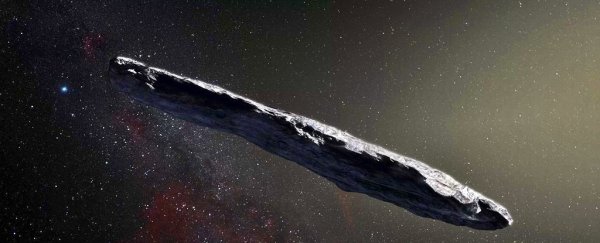In a new interview with the Israeli newspaper Haaretz, the chair of Harvard University's Astronomy Department Avi Loeb defended his controversial hypothesis that the interstellar object known as 'Oumuamua could be an alien probe - and speculated at length about the place of humanity in the cosmos.
"As soon as we leave the Solar System, I believe we will see a great deal of traffic out there," he told Haaretz.
"Possibly we'll get a message that says, 'Welcome to the interstellar club.' Or we'll discover multiple dead civilizations - that is, we'll find their remains."
After astronomers first spotted the object later dubbed 'Oumuamua - a Hawaiian word that means "messenger sent from the distant past to reach out to us" - Loeb and a colleague speculated that a hypothetical propulsion device called a solar sail could explain its odd trajectory.
Another odd finding was that the object's brightness from reflected sunlight changed by a factor of ten as it spun, implying that it could be a cigar- or pancake-shaped object tumbling through space - an extremely unusual geometry for naturally-occurring asteroids.
An attempt to listen for radio signals from the mysterious object came up dry, but Loeb told Haaretz that he stands by the possibility that the probe is of intelligent origin.
"We have no way of knowing whether it's active technology, or a spaceship that is no longer operative and is continuing to float in space," Loeb told Haaretz.
"But if 'Oumuamua was created together with a whole population of similar objects that were launched randomly, the fact that we discovered it means that its creators launched a quadrillion probes like it to every star in the Milky Way."
Loeb has embarked on a media blitz recently, giving a separate interview last week in which he predicted the impact on humanity of discovering an extraterrestrial civilization.
In the interview with Haaretz, he suggested that the universe could be littered with alien societies and that Earthling scientists should focus on finding evidence of them.
"Our approach should be an archaeological one," he said. "In the same way we dig in the ground to find cultures that no longer exist, we must dig in space in order to discover civilizations that existed outside the planet Earth."
"The search for extraterrestrial life is not speculation," he added. "It's a lot less speculative than the assumption that there is dark matter - invisible matter that constitutes 85 percent of the material in the universe."
This article was originally published by Futurism. Read the original article.
